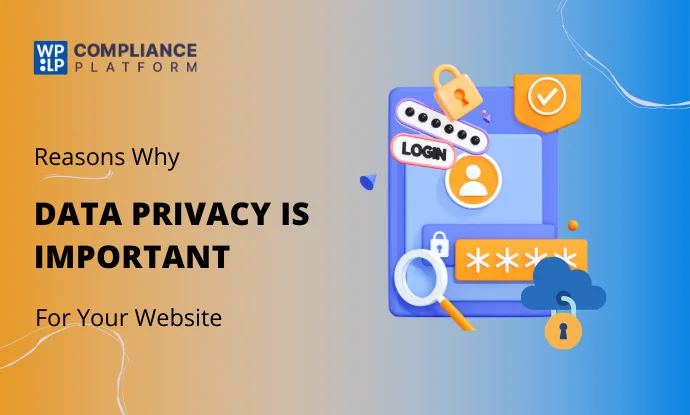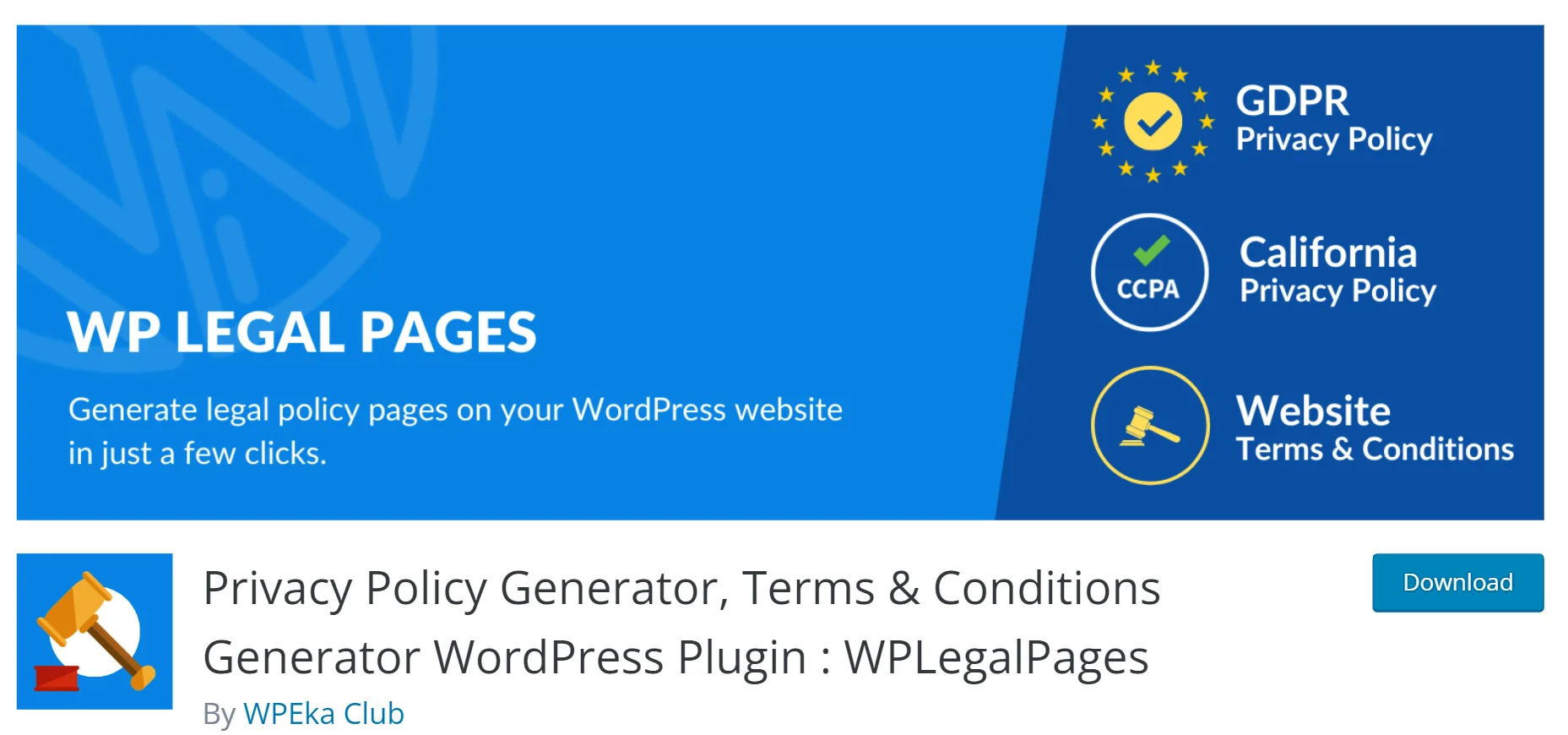Why Data Privacy Matters for Websites & Businesses

Summary
Our article covers GDPR, CCPA, and how strong data protection builds trust. It explains compliance, data governance, and transparency in data collection.
Staying compliant helps businesses remain competitive.
Wondering why data privacy is important for your business?
Data privacy is nothing but a shield for your business that safeguards your customers’ private and sensitive data from unauthorized access.
Maintaining data privacy is important if your website collects data through cookies because it prevents data breaches.
Complying with online privacy laws is essential in this digital world. Many laws, such as GDPR, CCPA, PIPEDA, and more, safeguard individuals’ digital data.
In this article, lets us discuss the reasons why data privacy is important.
- What is The Importance of Data Privacy?
- Data Security vs Data Privacy
- How Is Data Privacy Related to Data Security?
- Why is Privacy And Data Security So Important?
- 1. Helps to Comply With Laws Around The World
- 2. Helps to Gain Trust and Retain Customer
- 3. Build Effective Data And Management Practices
- 4. Helps to Minimize the Risk and Cost of Personal Data Breaches
- 5. Helps You Keep Up With The Changing Environment
- 6. Helps With Competitive Advantage
- 7. Helps With The Protection of Intellectual Property
- Data Privacy Laws and Compliance
- How WP Legal Pages Can Help With Data Privacy
- FAQ
- Conclusion
What is The Importance of Data Privacy?
Data privacy is a concept of safeguarding and protecting personal information regarding the storage, access, retention, and security of sensitive data.
It deals with personally identifiable information (PII), typically related to data privacy, including names, addresses, credit card numbers, and social security numbers.
However, the concept applies to sensitive financial, intellectual, and health-related data.
Several regulations protect individuals’ online privacy, including the California Consumer Privacy Act in California and the General Data Protection Regulation (GDPR) in the European Union.
Complying with data privacy laws is mandatory for all data protection measures.
Data privacy is important because it consists of these five components.
- Legal Framework
- Data Protection Policies
- Third-party Associations
- Data Management
- Global Requirements
Data Security vs Data Privacy
Despite their frequent interchangeability, data security and privacy are two separate concepts. Let’s examine each one closely.
- Data privacy: This term describes the policies and procedures for handling sensitive information, such as when and how to gather and share personal information.
- Data security: Data security is the process of stopping illegal access, theft, and modification of personal data. It comprises procedures and tools like network monitoring, password management, and encryption.
Hacking risks can originate both externally and within. An IT team may employ various strategies to secure data across various platforms and apps, including hashing, tokenization, encryption, and other techniques.
How Is Data Privacy Related to Data Security?
Data protection includes both privacy and data security, regardless of their differences.
Data protection involves preventing unlawful access, use, and disclosure of data. Implementing rules, practices, and technological tools is necessary to guarantee data availability, confidentiality, and integrity.
Because data privacy focuses on preventing unlawful use and disclosure of sensitive and identifiable data, it falls within the broader data protection category. Therefore, by ensuring data is protected, organizations may uphold the confidentiality of sensitive information and defend individuals’ right to privacy.
Why is Privacy And Data Security So Important?
Since privacy is seen in many countries as a fundamental human right, data protection is important to protect human rights and confidential information. Before interacting online, People need to know that their personal information will be handled with care, which is why data privacy is important.

Data privacy is crucial for the following main reasons:
1. Helps to Comply With Laws Around The World
Data privacy matters most obviously because it helps businesses comply with existing regulations and shield themselves from liability.
Data privacy laws extend to companies globally if certain thresholds are met, but they primarily protect individuals residing in the region where the legislation was passed.
- GDPR:- General Data Protection Regulation
- CCPA/CPRA:- California Consumer Privacy Rights Act
- CalOPPA:- California Online Privacy Protection Act
- PIPEDA:– Personal Information Protection and Electronic Documents Act
Although the list above does not include all privacy laws worldwide, it does include the most important data privacy laws worldwide.
Ignoring data privacy regulations can result in large fines and negative public perception. Your company might also be forced by law to cease data processing operations.
2. Helps to Gain Trust and Retain Customer
Trust is crucial, and in today’s digital world, internet users are becoming more conscious of the good and bad practices of data privacy that companies use for their personal data.
For instance, people are more conscious than ever that personal data is the foundation upon which MNCs like Apple, Google, Meta, and others construct their empires.
Companies must prioritize privacy and be transparent about their data management practices. This will help build trust with customers and improve their relationships.
3. Build Effective Data And Management Practices
It is essential to have proper data privacy protocols in place for effective data management practices.
Managing personal data effectively has many benefits for your company, such as increased revenue, offering more relevant marketing materials, improving client satisfaction, and strengthening customer service.
Effective data management empowers your company to provide clients with greater control over the personal information they share.
Thanks to most data protection regulations, individuals have more control over how firms collect and use their personal information.
4. Helps to Minimize the Risk and Cost of Personal Data Breaches
Another reason data privacy is important is that it is critical to reducing the costs associated with a personal data breach.
Breaches can range from sending an email containing sensitive information to a malware attack that compromises the entire IT system.
The financial implications of a data breach are significant, including fixed penalties and fines under data protection laws.
Negative customer perception and communication costs are other consequences. Data transparency can help businesses mitigate regulatory sanctions and public scrutiny.
5. Helps You Keep Up With The Changing Environment
Global Privacy Controls and Google’s Privacy Sandbox are two examples of in-browser privacy-enhancing tools that provide users with more control over their personal data.
With these settings, users will be able to manage their preferences within their browsers and automatically send preference signals to websites.
However, in the meantime, knowing data privacy will give your company the much-needed solid groundwork.
6. Helps With Competitive Advantage
Prioritizing data privacy can give your business a competitive advantage.
Strong data protection measures can gain customer trust and preference, leading to increased acquisition and retention.
A positive brand image can attract and retain customers and enhance a company’s reputation.
Data privacy fosters trust and positions businesses as reliable partners, driving collaboration opportunities and competitive advantages.
7. Helps With The Protection of Intellectual Property
As a business owner, you must prioritize data privacy to protect your intellectual property, promote innovation, and build a solid reputation as a reliable partner.
By implementing strong data protection mechanisms, businesses can prevent illegal access to and theft of trade secrets, proprietary data, secret plans, and cutting-edge technologies.
By doing this, you will maintain their competitive advantage while simultaneously encouraging innovation and strategic benefit.
This dedication to protecting confidential data reduces risks and positions the company as a valuable partner in industry coalitions, all of which support the company’s long-term development and success.
By emphasizing data privacy, you protect your intellectual property and enhance your desirability as strategic collaborators and innovators within your respective industries.
Data Privacy Laws and Compliance
As data collection technology has advanced over time, governments all around the world have begun to enforce rules on businesses that handle personal data.
Multiple national, international, and local data protection laws control the information that businesses gather, handle, and safeguard.
Let’s look at some of the most well-known legislation pertaining to data privacy:
1. California Consumer Privacy Act (CCPA)
The California Consumer Privacy Act (CCPA) regulates the collection and use of customer personal information. The state’s privacy rules apply to companies that operate within or outside of California and offer goods and services to Californian consumers.
Additionally, the CCPA guarantees that businesses will not sell customers’ personal information by allowing them to opt-out. To protect these rights, businesses must enable the Do Not Sell My Information button on their websites.
2. General Data Protection Regulation (GDPR)
The General Data Protection Regulation (GDPR) is the world’s most strict and detailed privacy and data protection law. It considers people’s privacy regarding personal information and is founded on fundamental rights.
GDPR states that people are legally allowed to remove any personal information they have obtained.
3. Children’s Online Privacy Protection Act (COPPA)
The US Federal Trade Commission enforces the Children’s Online Privacy Protection Act (COPPA).
This act severely restricts how online companies and app developers may handle the data of consumers younger than thirteen.
Fundamentally, it’s about parents’ control over how much information applications collect about their kids. Once more, this impacts foreign businesses that cater to US consumers.
4. Personal Information Protection and Electronic Documents Act (PIPEDA)
A Canadian law known as the Personal Information Protection and Electronic Documents Act (PIPEDA) mandates that organizations obtain an individual’s agreement before gathering, revealing, or even utilizing personal data about them.
It enables individuals to examine and contest the accuracy of the personal data that the covered organization holds about them.
In addition, PIPEDA mandates that organizations maintain the security of the information and forbids them from utilizing it for any new purpose without first obtaining new, explicit consent.
How WP Legal Pages Can Help With Data Privacy

WP Legal Pages offers tools, solutions, and policy generators that can help make your data privacy journey easier and smoother, regardless of where you are in the process.
Using pre-designed policy templates, you can not only use a pre-made policy but also comply with laws such as e-privacy, CCPA, GDPR, and more.
It creates a customized policy based on your responses to a few easy questions, which you can insert directly onto your website or mobile application.
You can use approval Management Platforms (CMS) such as WP Cookie Consent to get users’ explicit approval before collecting their data.
WP Cookie Cosent plugin helps you to make cookie banners that allow users to provide consent to collect user information.

Furthermore, you can add a data request form to your privacy settings and enable a consent forwarding feature to obtain user consent on one site and count it for selected sites in the network.

WP Cookie Consent allows you to access these settings directly from the WordPress dashboard.
Therefore, if you’re a website owner, creating a privacy policy and implementing a cookie consent banner for your website is an ideal choice.
FAQ
Data privacy is important to businesses because it prevents fraud and data breaches of individual information.
Data privacy is important to businesses because it prevents fraud and data- breaches of individual information.
GDPR, CCPA, PIPEDA, and the ePrivacy Directive are some of the essential laws.
Conclusion
As we all know, data privacy is important for any business that runs online. Knowing the difference between data security and privacy is important so business owners like you can protect their clients’ information.
When gathering and maintaining consumer information, it’s critical to be mindful of the various rules and regulations that regulate data privacy.
Using WP Cookie Consent and WP Legal Pages compliance solutions, you can prioritize data privacy. These plugins ensure that everyone can access the Internet safely.
If you liked reading this article, don’t forget to read our other engaging articles:
- Best Privacy Policy Generators For Your Website
- Data Transparency: Definition, Benefits, and Tools
- Data Privacy Issues To Avoid
Are you excited to create a privacy page for your website? Grab WP Legal Pages now!
